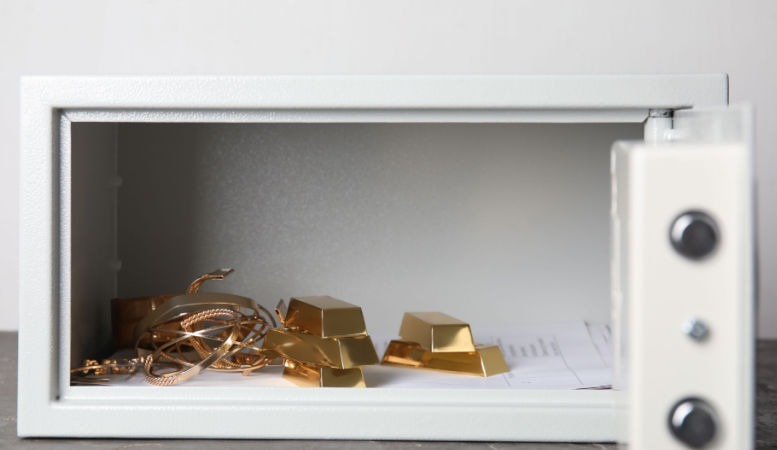Table of Contents
Do you want to add precious metals, such as gold and silver coins, to your retirement savings? You might have seen advertisements promoting home storage gold individual retirement accounts (IRAs).
At first glance, a home storage gold IRA might seem like a viable option to gain physical possession and control of gold bars as retirement assets without paying storage fees. However, under Internal Revenue Service (IRS) rules, bullion held in an IRA must be in the possession of an approved custodian.
In this article, we at Oxford Gold Group discuss home storage gold IRAs and the potential legal repercussions of setting up these accounts. We also look at legal ways to store gold in your home and the reasons to open a gold IRA.
What Is a Gold IRA Account and How Does It Work?
Before diving into home storage gold IRAs, it might be helpful to look at what a regular gold IRA is.
How does a gold IRA work? A gold IRA is a self-directed IRA (SDIRA) that lets investors own physical precious metals in addition to conventional securities, such as stocks, bonds, and exchange-traded funds.
Investing in a gold SDIRA with IRS-approved gold bullion and coins can hedge against inflation, diversify your portfolio, and help you take advantage of tax benefits. A gold IRA can be a traditional or Roth account, and you can choose a type that fits your tax situation and financial objectives.
Various rules apply to a precious metals IRA:
- Gold must have a purity of 99.5%
- Silver must have a purity of 99.9%
- Platinum must have a purity of 99.95%
- Palladium must have a purity of 99.95%
You can’t add gold or other precious metals to your SDIRA yourself. An IRS-approved custodian must set up a gold IRA on your behalf, transfer the funds to a precious metals dealer, and arrange for the transportation and storage of the gold coins or bullion.
Third-party custodians or trustees who oversee the administration of IRAs include IRS-approved banks, credit unions, trust companies, and brokerage firms.
After opening your precious metals IRA, you can fund your account through a transfer or rollover from an existing IRA or 401(k) plan. You can also contribute via check or wire transfer. If you are over 50, you can contribute up to $7,000 to your gold IRA annually.
Once you have funded your self-directed IRA, you can instruct your IRA custodian on how to purchase gold with the funds. IRA custodians must store the IRA-purchased gold in an IRS-approved depository.
What Is a Home Storage Gold IRA?

A home storage gold IRA lets you hold physical gold and other precious metals in your home. While it is possible to set up this type of account legally, the process involves a long list of requirements and high costs.
Some advertisements might claim that, as the account holder, you are your own IRA custodian. In other words, as the IRA owner, you buy precious metals with your IRA funds, then store these IRA assets in your home or the safety deposit box of a financial institution.
In almost all cases, home storage gold IRAs violate IRS rules.
What Does the IRS Say About Home Storage Gold IRAs?
An individual retirement account represents a partnership between the account holder and the IRS. You can only take advantage of tax-deferred growth or tax-free distributions in retirement if you adhere to the IRS’s IRA statutes.
Internal Revenue Code §408 classifies gold and other precious metals as “collectibles.” The IRS regulations discourage investors from holding collectibles and other unconventional assets, such as real estate and closely held companies, in an IRA.
However, an exception exists for highly refined bullion in the physical possession of a bank or an IRS-approved nonbank trustee, and this is where a gold IRA account comes in.
The IRS imposes the trustee requirement and denies people control over their IRS-approved precious metals for various reasons. For example, the government wants to ensure the gold in your SDIRA exists and that all account distributions are on record.
In short, you can only hold specific forms of precious metals in an IRA, and the IRS prohibits IRA owners from storing their IRA assets in their homes.
You have the option to form a limited liability corporation (LLC) with your SDIRA as the sole member, then appoint yourself as the entity’s manager. These “checkbook” IRAs offer various benefits, including complete control over the account’s day-to-day transactions.
However, forming a checkbook IRA doesn’t allow you to sidestep the IRS restrictions. All collectibles under this account must be in the physical possession of a financial institution or another trustee.
What Are the Penalties for Incorrectly Opening a Home Storage Gold IRA?

Those who promote home storage gold IRAs often claim that loopholes exist around IRS rules. Some bullion dealers even assert that their home storage gold IRA is the only one the IRS approves.
However, despite these claims, when you open a home storage gold IRA, you can potentially face significant penalties, fees, or taxes on your entire IRA. The IRS takes the home storage of IRA gold seriously and has the means to take action against you at any time.
Distribution Penalties
Your IRA-purchased gold might be subject to early distribution penalties.
Under IRS rules, if you make an early withdrawal before the age of 59½, the IRS will charge you a 10% penalty on the funds you withdraw.
Suppose you buy gold bullion with your SDIRA funds, then store the bullion at your home. In this case, the IRS will consider the purchase a distribution with a value that equals the purchase amount. For example, if the IRA-purchased precious metals for home storage cost $10,000, you can expect an IRS early distribution penalty of $1,000.
Income Tax Consequences
The retirement savings you use to purchase gold for home storage can lose their tax-deferred status. In other words, these funds, which the IRS considers distributions, become subject to income taxes. Your tax obligation can increase significantly depending on the amount you invest in a home storage IRA.
Prohibited Transaction Treatment
The IRS might consider the action of storing IRA gold in your home as “self-dealing” and treat it as a prohibited transaction. In other words, the IRS might disqualify your account as an IRA and consider all assets in the account as distributions. Additionally, if the value of these “distributions” exceeds the basis in the IRA, your income will reflect a taxable gain, increasing your obligation.
IRA Audits
The IRS often conducts invasive audits on home storage gold IRA owners. After the IRS finds that you have stored IRA gold in your home, it might zero in on you to determine whether you are violating other rules. Depending on what they find, these audits often result in additional penalties and fines.
What About Those Ads Promoting Home Storage Gold IRAs?

Any company promoting a home storage IRA account as a legal investment solution is likely misleading its audience.
During times of economic uncertainty, home storage gold IRA advertisements draw attention, especially from people with a low tolerance for risk. These ads tend to focus on the benefits of having complete and physical control over tangible assets. In some cases, these promotions include add-on benefits, such as a free safe that you can use to store gold and other precious metals.
Companies, such as precious metal dealers, might present a checkbook IRA as a way to store gold in your home legally. Even though this type of IRA offers various benefits, the ability to take physical possession of your IRA gold is not one of them.
The benefits of gold investment in these ads are generally accurate. Buying gold can help diversify your portfolio, and its value tends to increase as the dollar’s purchasing power declines. Gold also holds its value and is a liquid asset, which means you can easily sell it.
When you see an advertisement promoting a home storage gold IRA, tread carefully. Storing your IRA gold at home might seem beneficial, but it increases your risk of a run-in with the IRS.
Legal Ways To Store Physical Gold in Your Home
If you want to store gold in your home, various legal options are available.
Establish a Legal Home Storage Gold IRA
You can legally set up a home storage gold IRA and store physical gold in your home. However, you will have to jump through many hoops, with regulatory compliance presenting the most significant challenge. The process of qualifying for and forming a legal home storage gold account is nowhere near as quick and easy as some advertisers would have you believe.
Before qualifying for a home storage gold account, the IRS requires that an applicant:
- Register a limited liability corporation (LLC) with a unique operating agreement
- Undergo detailed annual audits by a certified public accountant
- Has corporate legal counsel on retainer
- Has verifiable fiduciary experience with a reputable financial background
- Has verifiable experience handling retirement funds
- Operates from a place of business that is open to the public
- Has a minimum net worth of $250,000 or higher after incorporation and audits
- Has a fidelity bond of $250,000 for each of the LLC’s owners and employees
You must meet these requirements before you can buy precious metals. Even if you qualify for a legal home storage account, you still need a custodian on record.
Buy Gold Outside a Retirement Account
You can legally store physical gold in your home if you purchase it outside your SDIRA. With this option, you don’t need to comply with purity restrictions, and you can choose from a more comprehensive range of bars and coins.
However, no tax advantages apply to this method. Your gold purchases are not tax-deductible, and you must pay income tax on your gains when you sell the gold in retirement.
If you want to invest in gold as part of your retirement planning while taking advantage of tax-deferred growth, you should consider gold IRA accounts.
Opening a Gold IRA the Right Way

Traditional or Roth IRA providers generally only deal with conventional assets, such as stocks and bonds. However, with self-directed IRAs, you have the freedom to add precious metals to your retirement portfolio.
After creating your SDIRA, you need to fund your account. You can transfer funds from an existing retirement plan, such as a 401(k), a 403(b), or annuities.
The last step is selecting IRS-approved precious metals you want to add to your account. Oxford Gold Group can help you choose physical gold bullion that will fit your investment objectives.
Can You Hold Precious Metals Other Than Gold in a Gold IRA?
You can add various precious metals to an SDIRA, including gold, silver, palladium, and platinum. As an SDIRA holder, you can invest in other assets, including real estate and cryptocurrency.
Because an SDIRA establishes a partnership with the IRS, you must follow various rules to avoid penalties and enjoy tax advantages. An IRS-approved trustee must store physical palladium or platinum, and the metals must meet the relevant purity requirements.
Get in Touch With Us at Oxford Gold Group
Gold IRAs make it possible to invest in precious metals for retirement while reducing your tax obligation. However, to take advantage of these benefits, you must comply with IRS rules, which require that an approved custodian stores the physical metals your account holds. You can’t store physical gold that forms part of your SDIRA in your home.
Are you looking for an alternative to a home storage gold IRA? At Oxford Gold Group, we can help you convert your existing IRA or 401(k) plan into gold. If you want to diversify your portfolio and soften the blow of inflation, we can help you set up a Gold SDIRA that complies with all IRS regulations.
To start investing in gold with confidence, call our representatives at Oxford Gold Group at (833) 600 – GOLD.








